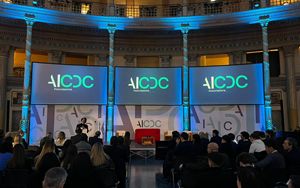(Finance) – “We ask Parliament and the Government for a bill for the approval of a regulation and protection code for a completely new sector which has been left without an adequate regulatory system for too long. The Association will shortly provide a proposal”. As Sara Zanotelli, President of the Italian Content & Digital Creators Association, opens “C for economy – The content creator: a future that is already present”an event that marks the official birth of the Association in the presence of the Vice Prime Minister and Minister of Infrastructure Matteo Salvini.
“Governments and businesses are called to invest to support the transition to the jobs of the future through education, retraining and social support structures that can ensure individuals are central to the future of work.” Instead, comment in a written message Adolfo Urso, Minister of Business and Made in Italy. “As proof of MIMIT’s projection towards the economy of the future, I remind you that in the Budget Law we have foreseen 3 links dedicated to the sectors of tomorrow: one for the blue economy, one for the space economy and finally one for frontier technologies for which you can be champions and disseminators”.
The Association, led by Sara Zanotelli, was born this year to represent a sector, that of the creator economy, which counts over 350 thousand professionals and which, according to I-Com estimates, It has a potential turnover of 2.55 billion euros. Penetration is also widespread: 76% of the Italian population follows at least one influencer, 21 million Italians at least three and 7 reach over ten. Overall, 57% of Italians declare that they are always interested in the products recommended by influencers.
To 250 creators have already joined the Association, led by Khaby Lame, with 160 million followers on TikTok and first on Instagram with 80 million followers, Luca Campolunghi, Sespo, Giulia Latini, Gabriele Vagnato, Klaus, Cartasegna, Samara Tramontana, Andrea Muzzi and Ignazio Moser.
From ethics to legislation, from communication to the artistic dimension, “C for Economy” is divided into five panels, which was attended, among others, by Claudio Durigon, Undersecretary of State at the Ministry of Labor and Social Policies, Massimiliano Capitanio, AGCOM Commissioner, Massimo Camisasca, Director General of ISTAT, Stefano da Empoli, President of I-Com, Alessandra Ghisleri, Director of EuroMedia Research, Paolo Boccardelli, Director of the LUISS Research Center, Paola Frassinetti, Undersecretary of State at the Ministry of Education and Merit, Raffaella Paita, National Coordinator of Italia Viva, Michele Sciscioli, Head of the Department for Youth Policies and Universal Civil Service and Antonio Affinita , General Director MOIGE.
Dominant, during the conference, it was the topic of ethics, for which it is becoming increasingly necessary to introduce a dedicated code that supervises the potentially harmful implications, especially for the most fragile categories. It is in this context that the AICDC code of ethics was presented, a set of guidelines defined collegially by all the professionals who have joined the Association and which identify clear rules, procedures and moral values with which one can conform.
Very widespread, in fact, too cases of cyberbullying and hate speech: in the research developed by MOIGE “Media diet and cyberbullying” 31% of the kids interviewed say they have suffered “bullying” online. An average that remains unchanged as age changes: young people who admit to having suffered them “sometimes”, therefore excluding systematic victims, is equal to 20% in the 6-10 year age group, a percentage that rises to 21%. in the 11-14 age group and 23% in the 15-18 age group. 45% of children say they have witnessed episodes of bullying online and 34% know someone, at school or outside of school, who has been a victim of cyberbullying.
“The creator economy sector is becoming increasingly relevant in the context of the Italian economy” – He underlines on the sidelines of the event Sara Zanotelli, President of AICDC. “And this is why, also in line with the indications of Agcom, it is more necessary than ever to start an ethical and legislative debate on the professionalisation of the category. Today we have started a discussion with the institutions, and we are ready to apply with the our associates the code of ethics that we presented for the first time here, a tool that allows us to certify at all levels the validity of the creators who are part of AICDC”.
“Through this association, we want to address all professionals in the creator economy.” He commented Mauri Valente, Vice President of the Italian Content & Digital Creators Association. “Not only to the frontmen, influencers and digital creatives, but also to the entire vast ecosystem that revolves around it: from managers to agencies, who deal every day with a profession whose dimensions and boundaries are still very blurred.”
During the event the birth of theObservatory on the Creator Economy, in collaboration with I-Com, Institute for Competitiveness and the “Franco Fontana” Research Center in Strategic Change of LUISS. The initiative was created with the aim of analyzing the dimension in economic and employment terms of the digital content creator market in Italy and of developing policy proposals to be submitted to political decision makers to direct the development of the sector for the benefit of the country. The Observatory is supported by Digit’Ed, the first training center in Italy and one of the major players in the sector at European level, and by Nextalia, an asset management company, established with the aim of investing in Italian excellence to accelerate its sustainable growth path.
